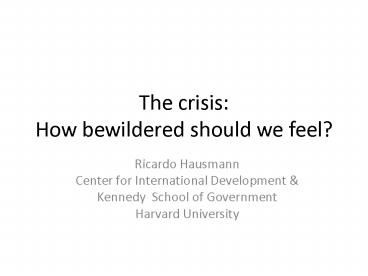The crisis: How bewildered should we feel? PowerPoint PPT Presentation
1 / 11
Title: The crisis: How bewildered should we feel?
1
The crisisHow bewildered should we feel?
- Ricardo Hausmann
- Center for International Development
- Kennedy School of Government
- Harvard University
2
Agenda
- How is the world?
- How did we get here?
- What does this diagnostic imply?
- How scared should we (Latin Americans) be?
- How much should we change our economic policy
beliefs? - How will Latin American countries fare?
3
The world is a mess
- Biggest global recession since 1929
- Synchronized as never before
- Sept 15, 2008
- Starting in the center, not the periphery
- Spreading globally instantaneously
- Amazing collapses in asset values
- Response includes huge fiscal deficits, zero
interest rates, incredible expansions of central
bank balance sheets (US, UK and Japan)
4
What happened?
- Financial crisis
- A heart attack
- Not much use to discuss what caused it
- Too much booze, lack of exercise
- Or how to prevent the next one
- The asymmetry of regulation
- Now we want them to lend but they dont
- It caused a collapse in counter-party trust
- closing down all credit markets
- triggering an asset price collapse
- and a major decline in demand
- Access to credit, wealth effect and lower animal
spirits
5
In other words
- A network of trust that disappeared
- Flight to safety
- Enter the super-borrower
- Increase in the ability to borrow of a few big
governments - They have the capacity to provide temporary
rewiring of the global system - Domestic fiscal expansion, GM, Citibank, etc.
- but are trapped in a country-focused political
process - Global problem, partial solution
6
Implications
- The problem
- The US is already spending more than it is
earning - Large current account deficit
- and is accumulating a ton of net debt
- The alternative (or the complement)
- Use the borrowing capacity to expand abroad
- Increasing export demand
- No increase in net debt new debt is matched by
new assets - Implementing
- Recapitalize the MDBs
- Buy a portfolio of EM securities, as Bernanke is
doing with student loans and credit card debt - Give the resources to the IFC to manage
7
How scared should we (Latin Americans) be?
- We have been here before
- Sudden stop in capital flows (1982, 1994, 1998,
2002) - Deterioration of the terms of trade
- Slower export demand
- ..we are more experienced
- we have better balance sheets
- did not have that much time to do stupid things
- The last crisis was as recent as 2002
- but things are also a bit different
- Many times in the past we got out through a real
depreciation and an export boom - This time around the crisis is global so getting
out of it may be more challenging - Like 1981-82, in the sense that it was a sudden
stop and a global recession - but harder then it was a desired recession
- it was followed by very rapid global growth
8
Should we change our ex-ante beliefs?
- Not much
- Old lessons are as good as ever
- Keep public debt low and well structured
- Level, currency denomination, maturity
- Keep exchange rate flexible and competitive
- Save fiscal resources in boom times
- Lean against the wind of excessive capital
inflows - Keep banks liquid, well capitalized and on a
short leash - Behave in a credible manner
- Budget institutions, credible supervisors,
property rights - Contrast Argentina and Uruguay
- Develop well structured safety net
- not just for the chronically poor
- but also for the suddenly impoverished
9
Should we change our views about crisis
management?
- Not too much
- Be as anti-cyclical as you can
- Do you have access to finance at reasonable cost?
- Are domestic real interest rates low?
- But we have not figured out what to do with our
reserves - We accumulated them for a purpose
(self-insurance) - But we are not sure what to do with them in a
crisis - We have let exchange rates take the hit instead
10
What would a better international financial
system do for us?
- Have sufficiently flexible access to
international liquidity so we can feel more
confident to expand at home - Hence, would increase the scope for anti-cyclical
policies - We may need more multilateral lending to cope
with a slow recovery of market access - Recapitalized WB and IDB
11
Who will do well? Who will do poorly?
- Disciplined, market friendly countries will
recover - Brazil, Chile, Colombia, Costa Rica, Mexico,
Peru, Uruguay - With differences, given their different
structures - They may even surprise
- Crises change the choice between exploitation
vs. exploration - Leads to new diversification
- Neo-populists and neo-totalitarian governments
will do poorly - High taxes on exports, no access to credit
markets, investor unfriendly, no economic freedom
to spur innovation, - Argentina, Ecuador, Nicaragua, Venezuela

